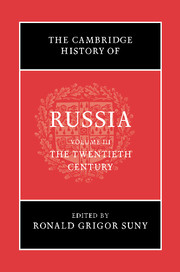Book contents
- Frontmatter
- Introduction
- 1 Reading Russia and the Soviet Union in the twentieth century: how the ‘West’ wrote its history of the USSR
- Part I Russia and the Soviet Union: The Story through Time
- 2 Russia’s fin de siècle, 1900–1914
- 3 The First World War, 1914–1918
- 4 The revolutions of 1917–1918
- 5 The Russian civil war, 1917–1922
- 6 Building a new state and society: NEP, 1921–1928
- 7 Stalinism, 1928–1940
- 8 Patriotic War, 1941–1945
- 9 Stalin and his circle
- 10 The Khrushchev period, 1953–1964
- 11 The Brezhnev era
- 12 The Gorbachev era
- 13 The Russian Federation
- Part II Russia and the Soviet Union: Themes and Trends
- Bibliography
- Index
- References
3 - The First World War, 1914–1918
from Part I - Russia and the Soviet Union: The Story through Time
Published online by Cambridge University Press: 28 March 2008
- Frontmatter
- Introduction
- 1 Reading Russia and the Soviet Union in the twentieth century: how the ‘West’ wrote its history of the USSR
- Part I Russia and the Soviet Union: The Story through Time
- 2 Russia’s fin de siècle, 1900–1914
- 3 The First World War, 1914–1918
- 4 The revolutions of 1917–1918
- 5 The Russian civil war, 1917–1922
- 6 Building a new state and society: NEP, 1921–1928
- 7 Stalinism, 1928–1940
- 8 Patriotic War, 1941–1945
- 9 Stalin and his circle
- 10 The Khrushchev period, 1953–1964
- 11 The Brezhnev era
- 12 The Gorbachev era
- 13 The Russian Federation
- Part II Russia and the Soviet Union: Themes and Trends
- Bibliography
- Index
- References
Summary
The Russian Empire entered what became known as the First World War in the summer of 1914 as a Great Power on the Eurasian continent; four years later, the Russian Empire was no more. In its place was a Bolshevik rump state surrounded by a ring of hostile powers who shared some loyalty to the values of the Old Regime, or a conservative version of the Provisional Government. The notable exception to this was Menshevik-dominated Georgia in Transcaucasia, which pursued a moderate but socialist transformation of its society. Although all the Central European dynastic empires (Austria-Hungary, the Ottomans, Germany and Russia) failed to survive the suicidal war, what succeeded the Russian Empire, namely, the Soviet socialist state, was unlike any other successor regime. Many of the origins of that Soviet state, and the civil war that did so much to shape it, can be traced to the preceding world war: new political techniques and practices, the polarisation of mass politics, the militarisation of society and a social revolution that brought to power a new set of elites determined to transform society even further while in the midst of mobilising for its own war of self-defence against domestic and foreign enemies. The war demanded unprecedented mobilisation of society and economy against formidable enemies to the west and south. The industrial mobilisation alone triggered ‘a crisis in growth – a modernisation crisis in thin disguise’.
Keywords
- Type
- Chapter
- Information
- The Cambridge History of Russia , pp. 94 - 113Publisher: Cambridge University PressPrint publication year: 2006

